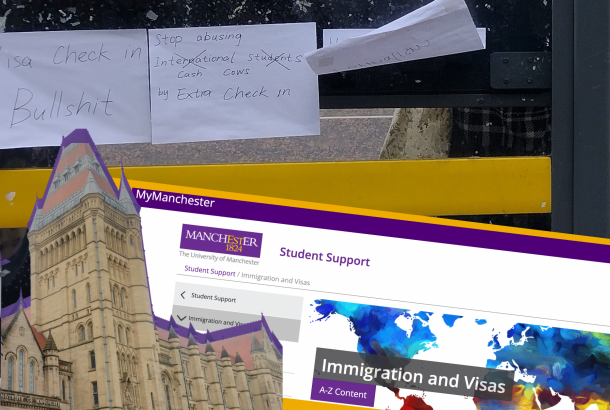No mandatory consent module for UoM students
By Jacob Robinson and Ella Green

Trigger Warning: this article contains references to sexual assault and rape with specific emphasis on student experiences. Please contact Report and Support at The University of Manchester if you have been affected by these issues.
The University of Manchester has no mandatory consent education, The Mancunion has discovered. The optional online consent module is completed by less than a quarter of students in SALC, calling into question the suitability of the current scheme.
Typical consent education in academic settings often involves a three-minute video detailing that consent is as “simple as tea”. Viewed 10 million times on YouTube, the video lets us know that drunk people might not want tea. However, consent – although it should be as straightforward as the video implies – is not understood this clearly in real life.
Sufficient consent education should involve discussions around what revoking consent looks like. Likewise, the role ‘blue balls’ plays in pressuring people into consenting or that having a sexual history with the person in question doesn’t entitle you to sex. Evidently, consent education requires informing students about coercion, nuance, and checking in on their partner. Yet, a mandatory and detailed education programme at this University is yet to be rolled out.
The university currently delivers a tiered approach to consent education. Before new students arrive, during the “pre-registration window,” they are invited to complete a Transitions module, in which the Healthy Relationships section gives the basics of consent.
Those who do not complete such activities are flagged and sent automatic reminders. Returning undergraduates and postgraduates (both those undertaking taught and research courses) are given variations of the same activity. Each school at the University has the opportunity to seek guidance from the Advice and Response team in the delivery of this education, but is not required to adhere to a standardised framework.
The School of Languages Arts and Cultures (SALC) is one of the schools with an established consent module. Last year 1396 students completed the SALC consent module. Completion rates so far for this academic year are 1672 students out of circa 7000, just 24% of students. Progress perhaps, but has it progressed enough?
Imogen Boylan and Sohini Biswas, co-chairs of Resist Rape Culture, a campaign at the University tackling rape culture and sexual violence, suggested a much needed overhaul of the University’s current approach is needed. They suggest the primary issue with the module is that it is not a compulsory activity and is not targeting a substantial, university-wide audience.
Resist Rape Culture suggest in-person talks on consent could be a more inclusive and engaging method, compared to the existing Zoom sessions. They proposed the idea of bringing in external speakers, in order to further educate a wider audience of students about consent. Imogen and Sohini argued that an online module does not tackle the issue in the most appropriate manner.
We spoke to a ResLife advisor, who revealed that in-person consent education was originally a part of the accommodation induction, but for the second year running it has not been included. Due to the Covid-19 pandemic, the induction was moved online and has remained this way despite the removal of restrictions.
Though the removal of in-person consent education from the accommodation induction is certainly discouraging, the same advisor revealed the proposals for a new online drug training course, which contains a module called Sex, Drugs & Consent.
The root of the problem here seems to stem not from a lack of understanding of the subject but rather from a lack of engagement. In order to encompass all students, the conversation needs to be fundamentally widened to promote inclusivity.
The University’s Students’ Union is also taking steps to improve. Celina Sousa Pereira, Wellbeing and Liberation Officer at the Students’ Union said that “working on the consent module is one of my key priorities for the year”.
Her aim is “by the end of the year is to ensure that consent education is mandatory, that it provides a comprehensive take on consent with the nuance and seriousness that it needs (as opposed to the Tea video they showed in my time), and that it includes non-heteronormative experiences as well.”
The Mancunion was informed by both the ResLife advisor and Resist Rape Culture that one of the primary obstacles was the absence of communication between Student Support and students, explaining the multitude of resources which are available but effectively remain hidden. Both suggested that valuable services from the University needed to be highlighted, including Report and Support.
In 2017, the University of Manchester was the first higher education institution in the UK to introduce Report and Support (part of Advice and Response), an online reporting system for incidents of sexual assault and rape.
Students, staff, and members of the public can use the system to report an incident anonymously or request to speak to an advisor, which will put them in contact with a specialist practitioner.
The Advice and Response Team also works in conjunction with Manchester City Council, Greater Manchester Police, and various sector networks, such as the Sexual Violence Action Network.
Resist Rape Culture and the ResLife advisor we spoke to similarly commended the service, with praise also for the Advice and Response Manager, Melissa Riley and Spencer Davies, Head of Advice and Response, and their suggestions for changes moving forward.
The pair told The Mancunion of the disclosure training frontline university staff receive. This aids them to refer students in incidents of sexual assault and violence, to services such as Report and Support. According to Melissa and Spencer, students in committee roles in societies will also hopefully be given this training over the next academic year.
Speaking to Melissa Riley, Advice and Response Manager (Safeguarding, Gender-based Violence and Hate Crime), she told us that consent education is a “lifelong ongoing practice which we all need to remind ourselves of.”
Spencer Davies, Head of Advice and Response, added that it is important to give “as many opportunities as possible” to complete consent education in order to prevent such events from unfolding.
Nonetheless, Melissa admits that “it’s not a one size fits all approach.” Changes have already begun to be made, with two hour theatre workshops given specifically to members of sports teams following incidents of sexual assault.
Melissa and Spencer told The Mancunion that a student-facing website, specifically for Report and Support, is in the final stages of development. Access to the Report and Support incident portal can currently be found on the Student Support website.
They were eager to tell us that there has been “no pushback from any area of the university” in their joint desire to reform the tackling of preventative and educational measures around consent training and the combatting of sexual violence. Their department enjoys hearing from students about how such educational measures can be improved, saying that they are “very lucky to work with students.”
Following a Freedom of Information request, it appears that like the consent module, students are not sufficiently familiar with these services. Given the number of students at the University, only 182 cases were reported in the last two academic years, a statistic that doesn’t appear particularly credible.
In 2022 alone, across Greater Manchester 1664 rape and sexual offence cases to people aged between 18-25 have been reported to Greater Manchester Police. It is a commendable system of support that is owed more exposure, both for a recognition of its work but also for the benefit of the student community.
Other universities have provided services that mirror the severity of the situation, presenting an overall more suitable strategy. Loughborough University champions the “Don’t be a Dick” campaign where every student has to complete the consent module prior to purchasing tickets to any events organised by the Students’ Union. They would thus be prohibited from any freshers week activities without first receiving a reminder of the complexities that coercion or nuance can pose. Freshers week is a particularly appropriate time for the reintroduction of this education given the considerable rise of sexual interactions during this period.
The university alternatively could adopt a similar approach to consent education as many other universities, by using a scheme called “Consent Matters.” Used by universities across the UK, including Manchester Metropolitan University, the scheme is an online, interactive consent programme. An explanation of the scheme on the University of Oxford’s website reads: “The programme offers initial training helping to build understanding of consent, respect, boundaries and positive intervention. Talking about sex can be difficult, and through the completion of the programme we hope students will learn how to recognise and ask for sexual consent, look out for others at the University, and find support if it’s needed.”
Whilst promised action from the University of Manchester is certainly a welcome step in the right direction, the need for mandatory consent education is apparent. Multiple UK universities have adopted such schemes, and given the devastating effects sexual assault can have on people’s physical and mental health, it is crucial that consent education, alongside key services such as Advice and Response are available to all students.
It is not plausible that something as oversimplified as the Tea video or as withdrawn as a Zoom call is sufficient education for something that has the ability to dismantle people’s lives. It inspires hope that the development of a new consent module is taking place. Given the logistical challenges of creating such a change, we can only hope for the mandatory integration of this module in the near future.
If you have been affected by any of issues raised in this article you can find support here:
Greater Manchester Rape Crisis or via telephone 0161 273 4500.
University of Manchester Report and Support
St Mary’s Centre or via telephone 0161 276 6515.







